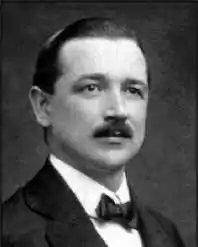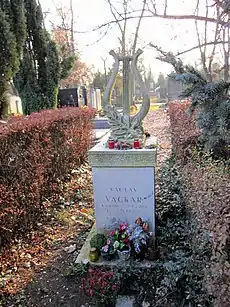Václav Vačkář
Václav Vačkář (born August 12, 1881, Died on February 4th 1954) was a Czech composer and conductor of the late romantic era. He was the father of Dalibor Cyril Vačkář, who was also a notable Czech composer.[1] He is well known for his marches especially for his March “Šohaj” which is well known in his native Czechia. Vačkář is also a very prolific composer with over 300 original pieces of music.
Václav Vačkář | |
|---|---|
 | |
| Born | 1881, 08, 12 |
| Died | 1954, 04, 02 |
| Nationality | Czech |
| Occupation | Composer, Conductor |
| Era | Late Romantic |
| Style | Nationalism |
| Spouse(s) | Johanna Faltysová (years of marriage unknown) |
| Children | Dalibor Cyril Vačkář |
| Awards | Smetana Prize of Prague |

Vačkář received military training in Przemyśl, Poland from 1895-1898 during which he began learning about music through a military program. After his time in Poland Váckář began to play and conduct in various local orchestras including the Czech Philharmonic.[2] In 1952 he wrote the book “Instrumentace Symfonického Orchestru a Hudby Dechové” (Instrumentation for the Symphony Orchestra and Wind Music) with his aforementioned son Dalibor Cyril Vačkář which is still taught in Czech conservatories.[3]
Influences
Vaćkář‘s predecessor Bedřich Smetana innovated the Czech nationalistic style. A style that embodied the desire many Czechs felt to secede from the Austrian Empire and was also adopted by many Czech composers — including Vaćkář. Another significant influence on Vačkář was Antonín Dvořák who was also a champion of Czech nationalism. Dvořak composed a series of Bohemian dances called the “Slavonic Dances” which impart inspired Vačkář to compose his own dances from Bohemia.
References
- Music News from Prague. Music Information Centre, Czech Music Foundation. 1985.
- "Vackár | Encyclopedia.com". www.encyclopedia.com. Retrieved 2020-07-12.
- Vačkář, Dalibor C.; Vačkář, Václav (1954). Instrumentace symfonického orchestru a hudby dechové I. Část textová. [II. Notové příklady.] Napsali Václav Vačkář a Dalibor C. Vačkář (in Czech). Státní nakladatelství krásné literatury, hudby a umění.